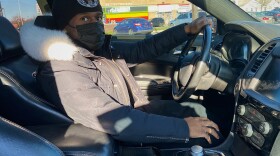A masked gunman props open the gas station door. He shoots. The gun jams. He wrestles with it and fires again.
“This person was focused on killing,” Detroit Police Chief James White said, showing a video of the recent incident at a news conference at police headquarters Thursday.
White said the shooting resulted in the death of a 15-year-old boy. Police said they believe the gunman is only a year older than his victim was.
“It sounds like, from what the investigators tell me, [this was] a social media conflict where they were to meet up here and have a fistfight,” White said. “The unfortunate thing is someone brought a gun to the fistfight and decided to use it.”
Since taking over as head of the Detroit Police Department last year, White has relayed the details in many similarly grim crimes. He said the crimes are part of what’s driving his department’s efforts to enforce gun laws, including concealed carry violations.
The start of the COVID-19 pandemic in 2019 brought a significant increase in serious crime in Detroit.
But even as gun violence fell slightly in the last year, the number of guns registered with police in Detroit has steadily increased, more than doubling in two years. The number went from about 9,000 in 2019, to 17,100 in 2020, and 22,200 in 2021.
"People are buying more guns, so there’s more opportunity for guns to be stolen, more opportunities for guns to fall in the wrong hands, more opportunities for people to use guns to resolve some disputes,” Detroit Police Chief James White said, attaching a series of issues to the reason there has been increased enforcement against guns.
The average number of arrests for carrying a concealed weapon tripled over the course of the pandemic, according to data analyzed by Neighborhood Defender Service. Lawyers with the public defense organization told Michigan Radio they saw an increase in cases in which people were asked about weapons following low-level traffic incidents, suggesting a strategy to target motorists.
Neighborhood Defender Service Detroit Managing Director Chantá Parker criticized the arrests as stemming from what she described as "driving while Black," arguing that carrying a concealed weapon was not a matter of public safety.
“These arrests of otherwise law-abiding citizens is what our legal system has spent so much of its energy on while COVID wreaks havoc on our communities," Parker said.
Chief White denied that Detroit police were involved in a concerted effort to raise the question of weapons at traffic stops, and said that arrests are regularly reviewed for civil rights violations, and footage of police conduct is randomly evaluated. He also noted that the number of concealed carry arrests declined over the last quarter of last year by 31% from the previous year's average.
"What that number tells us is that the message is getting out,” White said. “If you illegally carry a gun in our community, we're going to arrest you. We're unapologetic about that."
White said the department adopted policies against arresting multiple people connected with a single gun concealed in a vehicle, a matter raised as a concern by Marcellus Ball, a former Detroit police sergeant who retired last year. White noted that police are within their rights to make multiple arrests but issued a policy against doing so under his tenure.
White said that he was active in compliance with consent decrees, working with an independent monitor assigned to oversee the Detroit police for 11 years.
"We can constitutionally make our city safer, and we're going to do that,” White said. “We are not going to make apologies for making arrests for weapons [or] for people who use weapons to resolve disputes.”






